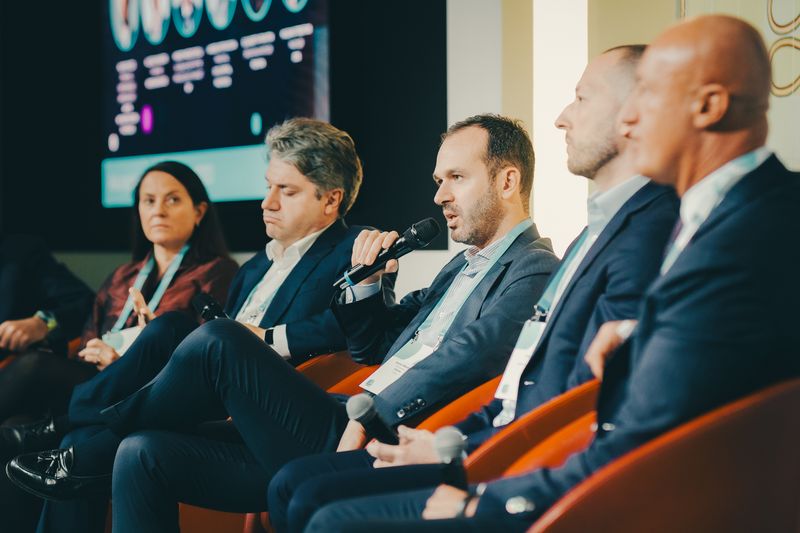Fresh from our successful 0100 Conference Mediterranean, we’re excited to share some highlights from our panels. Let's start with the Private Equity Stream. The first panel brought together leaders from prominent firms to explore evolving strategies for value creation in today’s increasingly complex landscape. Titled "Value Creation Strategies for the Future & How to Successfully Work Together with Your Operational Partners," this discussion featured insights from high-profile experts, including Filippo Pozzi of Antin Infrastructure Partners, Marco Mazzucchelli of BIP, Andrea Peyracchia of CVC Capital Partners, Elisabetta Frontini of Permira, and Alessio Masiero of NB Renaissance, moderated by Massimo Trentino of CMS.

Evolving Value Creation Strategies
Elisabetta Frontini from Permira began the conversation by discussing the evolution of value-creation strategies over the past few years. Reflecting on her 13 years at Permira, she observed how their approach has shifted towards increased sector specialization. Initially, the team was small, with broad functional expertise. Today, it has grown into a robust group of 25 members with niche specializations in sectors like consumer brands, digital transformation, and advanced analytics. This allows Permira to tailor its approach to each sector’s specific needs and enhance support for portfolio companies, exemplified by digital overhauls and CRM optimizations for brands like Golden Goose and Universidad Europea.

Shifting Towards Proactive Value Creation
Marco Mazzucchelli, head of BIP’s private equity market, echoed the sentiment of proactive, sector-specific involvement. He noted that value creation is no longer merely a post-transaction activity but is increasingly embedded within the initial transaction support process. Today’s strategies focus on operational readiness and resilience, ensuring that new acquisitions are prepared to tackle anticipated challenges. ESG considerations, digital transformation, human capital, and risk management have become central pillars in BIP’s approach, reflecting the need for a more functionally driven and bottom-up methodology.

Building Expertise and Operational Support
Alessio Masiero of NB Renaissance highlighted his firm’s emphasis on creating specialized in-house teams, including dedicated ESG and digitalization groups. With sectors like healthcare, industrials, and environmental sustainability at the core of NB Renaissance’s investments, the firm has expanded its resources to meet evolving demands, including supporting companies in refining digital strategies. Masiero cited Upower, a leader in safety footwear, as an example where advanced digital tools have enhanced customer insight and engagement, improving both marketing and sales effectiveness.
A Collaborative Approach to Portfolio Management
Marco Mazzucchelli underscored the increased emphasis on collaboration, noting that effective value creation now requires diverse skill sets from management teams, private equity partners, and their advisors. By fostering an environment where management teams and private equity partners work alongside their respective consultants, firms can drive the maximum value for each portfolio company. Andrea Peyracchia of CVC Capital Partners elaborated on this approach, describing how CVC has established an expansive ecosystem that includes a digital collaboration platform, "CVC Hub," which enables the sharing of best practices and fosters ongoing dialogue between executives and advisors across the portfolio.

Addressing Challenges in Talent Acquisition and Retention
Filippo Pozzi of Antin Infrastructure Partners spoke on the challenges of recruiting and retaining top talent, an essential factor in the success of value-creation strategies. Antin focuses on building long-term relationships with potential hires, developing an ecosystem of C-level executives, and aligning incentives to ensure shared vision and commitment. Elisabetta Frontini shared Permira’s unique approach to assessing leadership, which includes using an intensive interview process designed to reveal authentic capabilities and leadership styles, a critical factor in ensuring alignment with private equity’s rigorous performance expectations.
Sustainability as a Strategic Priority
Sustainability and ESG initiatives emerged as crucial elements in value-creation strategies, with panelists like Andrea Peyracchia and Elisabetta Frontini underscoring the growing importance of sustainable practices. Permira’s commitment to ESG is evident in its integration of ESG initiatives directly into its value creation team, ensuring that compliance and sustainability are fundamental to operational improvements. CVC Capital Partners has also tied ESG goals to performance metrics, linking a portion of carry to the achievement of ESG targets, thereby solidifying the firm’s commitment to responsible investing. For NB Renaissance, sustainability initiatives are integral to positioning companies for long-term success; for example, Rino Mastrotto Group has invested significantly in reducing its environmental impact in leather manufacturing.
The Future of Value Creation
Andrea Peyracchia sees the future of value creation as inherently tied to innovation, sustainability, and adaptability. With a rigorous focus on innovation—backed by a maturity indicator developed with MIT—CVC Capital Partners is committed to driving higher returns by staying at the forefront of AI and digital transformation. AI adoption across the portfolio, rather than in isolated developments, allows CVC to leverage advanced technologies for operational efficiency and strategic differentiation. Masiero and other panelists agreed that coupling financial returns with sustainability will be critical to maintaining a competitive edge in the evolving landscape.




